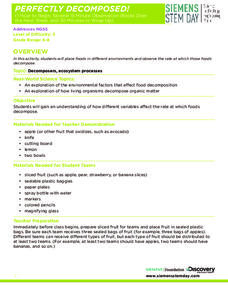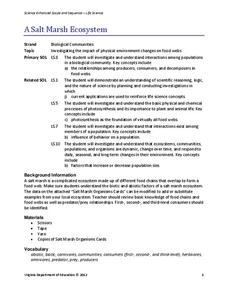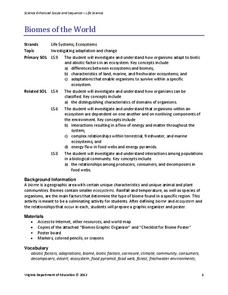Science Matters
Matter Cycles — Sum It Up
Scholars become part of the cycle of matter with a reader's theater that showcases producers, consumers, decomposers, and the sun. A diagram and discussion concludes the learning experience and enhances comprehension.
Discovery Education
Perfectly Decomposed!
We all know someone who won't eat the banana with a brown spot, the grape with a dimple, and the apple with a bruise. Scholars use different fruits to explore what happens when fruits really start to decompose. They set up an experiment...
NOAA
An Ocean of Energy
Young biologists trace the path of the sun's energy through marine ecosystems in the second part of this four-lesson series. Building on prior knowledge about producers, consumers, and decomposers young scholars are introduced to the...
NOAA
Understanding Food Chains and Food Webs
Jump into an exploration of marine ecosystems with the first lesson in this four-part series. After first learning about crustaceans, mollusks, and other forms of sea life, young marine biologists view a PowerPoint presentation that...
Science Matters
Energy Flow
Budding scientists work collaboratively to reenact energy flow in a food chain. Scholars take on roles such as producer and consumer and perform tasks that symbolize energy flow in order to provide evidence of how much energy passes...
Curated OER
Fuel Cell Experimentation
With rising oil prices and increasing concerns over global warming, the pressure is on for engineers to develop alternative sources of energy. Among the new technologies being developed are hydrogen fuel cells, which young scientists...
Exploring Nature Educational Resources
Building A Classroom Food Web
From bears and owls to chipmunks and trees, all life depends on the sun for the energy to survive. Young biologists develop an understanding of this big idea as they arrange this series of plant and animal picture cards into food webs...
Science Matters
Crawly Composters
Get your hands dirty with an interactive instructional activity that showcases the process of decomposing and returning nutrients back into the soil. After building a compost pile, pupils regularly observe the...
Consortium for Ocean Science Exploration and Engagement (COSEE)
Arctic Smorgasbord
Though the walrus spends roughly one third of its time on land, it eats organisms that live on the bottom of the ocean. The first in a series of five, the lesson uses a variety of plant and animal cards to have scholars build an arctic...
Science Geek
Build a Food Web Activity
Entangle your life science class in learning with this collaborative food web activity. Using pictures of the plants and animals native to a particular ecosystem, young biologists work in small groups to construct visual representations...
Alliance Theater
The Jungle Book Post-Show STEAM Lesson
An ecosystem is really just the flow of energy through many different living organisms. A study of Rudyard Kipling's The Jungle Book leads to an environmental science activity in which learners study how various factors can affect...
National Park Service
Living & Non-Living Interactions
What better way to learn about ecosystems than by getting outside and observing them first hand? Accompanying a field trip to a local park or outdoor space, this series of collaborative activities engages children in learning about the...
National Wildlife Federation
Habitat Web
Young scientists weave together an understanding of ecosystems with this fun collaborative activity. Taking on the roles of different living and non-living elements of specific habitats, learners use a ball of yarn to create the web of...
Virginia Department of Education
Freshwater Food Chains
What's in the water? Encourage your class to further explore this question and learn about pond ecosystems, food chains, and food webs as they complete this hands-on activity. They view the environment from a new perspective after...
Desert Museum
Daisy Ecology
Here's a fine lesson that combines poetry with life sciences. Learners carefully listen to a poem that's all about a food chain. As the poem is read, learners name the producer, the herbivore, the carnivore, and the omnivore. Lots of...
Virginia Department of Education
A Salt Marsh Ecosystem
What a web we weave. Pupils use yarn as the primary resource to create a web depicting the intricacies of a salt marsh ecosystem. They participate in a question and answer session, which leads to an in-depth facilitated discussion about...
Virginia Department of Education
Go with the Flow
How does nature's hierarchy relate to our local human environment? Answer this question, along with others, as the class visually depicts the natural hierarchy provided by nature. Pupils discuss each piece of the pyramid and its energy...
University of California
Energy and Biomass Pyramids
Young scientists play tag as they act out the food pyramid in the ocean ecosystem. Energy circles pass from the smaller prey to the predators and at the end of the activity, a data chart and analysis questions allow pupils to apply their...
Michigan State University
Friend or Foe?
What one person thinks is a pest may not be a pest to someone else. Here, scholars examine the characteristics of living things and pests through grand conversation and a variety of activities. Class members play a game of pest or not a...
NOAA
Seafood and Human Health
Whether your young biologists realize it or not, humans play a significant role in marine ecosystems. To help them understand this fact children first create graphical representations that show homo sapiens' place in marine food chains,...
EduGAINs
Go Eco! Ecosystems
How is a movie theater like a desert biome? Compare systems to ecosystems with a set of activities that focuses on accessing multiple intelligences and building upon knowledge. As learners discuss the ways elements of an ecosystem depend...
Virginia Department of Education
Biomes of the World
Incorporate knowledge about biomes and ecosystems in multiple ways while encouraging creativity. Emerging ecologists collaborate and perform research to complete a graphic organizer about various biomes of the world. They conclude the...























